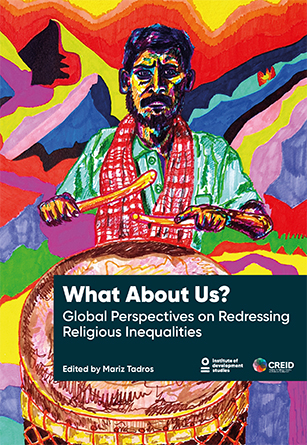How can we make religious equality a reality for those on the margins of society and politics?
This book is about the individual and collective struggles of the religiously marginalised to be recognised and their inequalities, religious or otherwise, redressed. It is also about the efforts of civil society, governments, multilateral actors, and scholars to promote freedom of religion or belief (FoRB) whatever shape they take.
The actors and contexts that feature in this book are as diverse as health workers in Israel, local education authorities in Nigeria, indigenous movements in India, Uganda, or South Africa, and multilateral actors such as the Islamic Development Bank in Sudan and the World Bank in Pakistan. Some of the case studies engage with development discourses and narratives or are undertaken by development actors, while other cases operate completely outside the international development paradigm. These case studies present some important insights, which while highly relevant for their contexts also draw out important insights for academics, practitioners, activists, and others who have an interest in redressing religious inequalities for socioeconomically marginalised populations.
This eBook is also available for download to your device at the following sites:

Subscribe to the Coalition for Religious Equality and Inclusive Development (CREID) email updates.
Table of Contents
PART 1: Introduction
Redressing Religious Inequalities and Challenging Religious Otherization: Global Perspectives and Encounters
Mariz Tadros
PART 2: Religious Inequalities in Education, Health, and Economic Wellbeing
Intercultural Training, Interfaith Dialogue, and Religious Literacy:
Minority Groups in the Israeli Health-Care System
Miriam Feldmann Kaye
Freedom of Religion or Belief Integration for Sustainable Development in the Oyo State Local Government Scholarship Scheme, First Technical University, Ibadan, Nigeria
Olumide Adebimpe Aderounmu
The Other Invisible Hand: How Freedom of Religion or Belief Fosters Pro-Social and Pro-Developmental Outcomes for the Poor
Rebecca Supriya Shah and Timothy Samuel Shah
PART 3: Tensions Between National Models of Development, Religious Equality, and Respect for FoRB
‘We Put God and Drums in the Front’: Spirituality as Strategy in an Adivasi Self-Empowerment Movement
Philip Mader
Sustainable Faith and Livelihoods: Promoting Freedom of Religion or Belief in Development
Rifqah Tifloen and Matome Jacky Makgoba
The Integration of Traditional Religious Beliefs in the Conservation of the Rwenzori Mountains National Park, Uganda: Processes, and Lessons Learned
Moses Muhumuza, Tom Vanwing and Mark Kaahwa
PART 4: External Actors’ Promotion of FoRB: Ideology and Political Will
International Assistance and Impoverished Religious Minorities in
Pakistan
Asif Aqeel and Mary Gill
Promoting Freedom of Religion or Belief in a Poverty Reduction
Programme in Sudan
Manal Ahmed (Elehemier)
Freedom of Religion or Belief Blind Spots in Development and
Peace-Building Theory and Practice
Katharine Thane
PART 5: Conclusion
Way Forward
Mariz Tadros
